The world needs a new type of science education, which stimulates creativity and open-mindedness in the people, said Bruce Alberts, a TWAS Fellow since 2001 and a Professor of Science and Education, Emeritus, University of California, San Francisco (UCSF), at his TWAS Sixteenth General Conference Medal Lecture.
Alberts is one of this year's four recipients of TWAS Medals, an accolade that the Academy has bestowed to its Fellows since 1996, in recognition of their professional commitment and scientific results.
The other three TWAS Medallists are nuclear physicist Rajaâ Cherkaoui El Moursli of Morocco, a TWAS Fellow since 2018; Sok Ching Cheong, a TWAS Young Affiliate Network (TYAN) member of Malaysia; and George Fu Gao, Vice-President, National Natural Science Foundation of China, and a TWAS Fellow since 2014.
The awards were announced on 21 November, after the opening ceremony of the TWAS Sixteenth General Conference in Hangzhou, China, held through 24 November 2022. On 23 November, Alberts presented his TWAS Medal Lecture — titled 'Science education for evidence-based decision-making: Research needed!' -- to present the conclusions from his focus on this issue for the past two decades.
Bruce Alberts is a scientific celebrity: he served two six-year terms as the President of the US National Academy of Sciences, from 1993 to 2005, after which he returned to the Department of Biochemistry and Biophysics at the University of California, San Francisco, in 2005, assuming the Chancellor's Leadership Chair for Science and Education.
From 2008 to 2013 he served as Editor-in-Chief of Science and, in 2014, he was awarded the President's National Medal of Science by President Barack Obama. He is renowned at the international level for co-authoring the celebrated textbook 'Molecular Biology of the Cell', used by hundreds of thousands of students and now in its 7th edition.
For more than 30 years, Alberts has focused on developing a new vision of the education system, emphasizing an active “science as inquiry” teaching mode, which includes logical, hands-on problem solving and work in cooperative groups to develop self-confidence, while also developing students’ abilities to communicate effectively with others.
His Medal Lecture stressed how critical science education is for the world. "People need to become more creative, open, and tolerant, with all adults using evidence and logic in making their decisions. In brief: the world urgently needs a "scientific temper," said Alberts. "And to create a scientific temper for the world we will need a new type of science education for all."
To explain what science education should be like in school, he described a curriculum designed for 5-year-old school children. To start this lesson, the teacher has the children walk outside under trees, wearing no shoes, only white socks. Back in the classroom, the children use tweezers to select each dark speck on the socks and place it in a numbered square on a piece of paper. They are then asked to suggest which of their specks might be seeds, after drawing what they see when inspecting each square with a 3-dollar plastic microscope.
Eventually, a child will suggest that the regularly shaped specks might be seeds. Being careful to avoid saying that this is the right answer, the teacher gets the class to agree that this idea could possibly be correct. How might they test the idea, she then asks? The class finally decides to plant all the regularly shaped specks in one pot, and all the others in another pot—following-up regularly to compare what develops in the two pots.
"Imagine the power of an education full of such challenges, increasing in difficulty over the course of 13 years of schooling! This would really prepare children for life," Alberts commented. But science education should be redefined also at the college level, he added, by introducing active learning. "The wrong way to teach science still predominates: there is often an exclusive focus on learning what science has discovered about the world, with students passively memorizing names and processes," he said.
He called for a new focus on teaching students how scientists investigate the world through inquiry, and also on how — by adhering to community rules — science produces knowledge that can be relied on for personal decision-making.
High-quality education research is needed to enable humanity to construct a powerful knowledge base to support the efforts of teachers, school administrators, colleges of education, and policy officials—with the ultimate goal of significantly improving student learning.
This is precisely the goal of the Strategic Education Research Partnership (SERP), a non-profit organization whose Board Alberts has chaired since 2005. A 2003 report from the US National Academies put forward an ambitious plan for a revolutionary programme of education research and development. Emanating from that report, SERP aims to construct such a knowledge base using scientifically based research that is closely linked to real-world classroom practice.
Education, he explained, has been missing "field sites": places where researchers, teachers and designers work, observe and replicate, and practice settings to define problems and test solutions in specific contexts.
"Widespread acceptability of evidence-free thinking, which extends far beyond science, is a danger to any democracy, and to me, it represents a failure of science education. This is why both education research and science education are such critical assets for the world. Education must produce adults who appreciate what science has discovered about the world, and the ability to investigate scientific problems like scientists do, using logic, experiments, and evidence," he urged.
If adults could adopt a scientific mindset and learn to solve their everyday problems the way scientists do, this would be a powerful way to protect humanity’s future.
Science, after all, knows no country, and knowledge belongs to humanity, as French chemist and microbiologist Louis Pasteur said. Committed to achieving this goal, Bruce Alberts will continue in pursuing his mission.
Cristina Serra
Watch Prof. Alberts' Medal Lecture video here:

